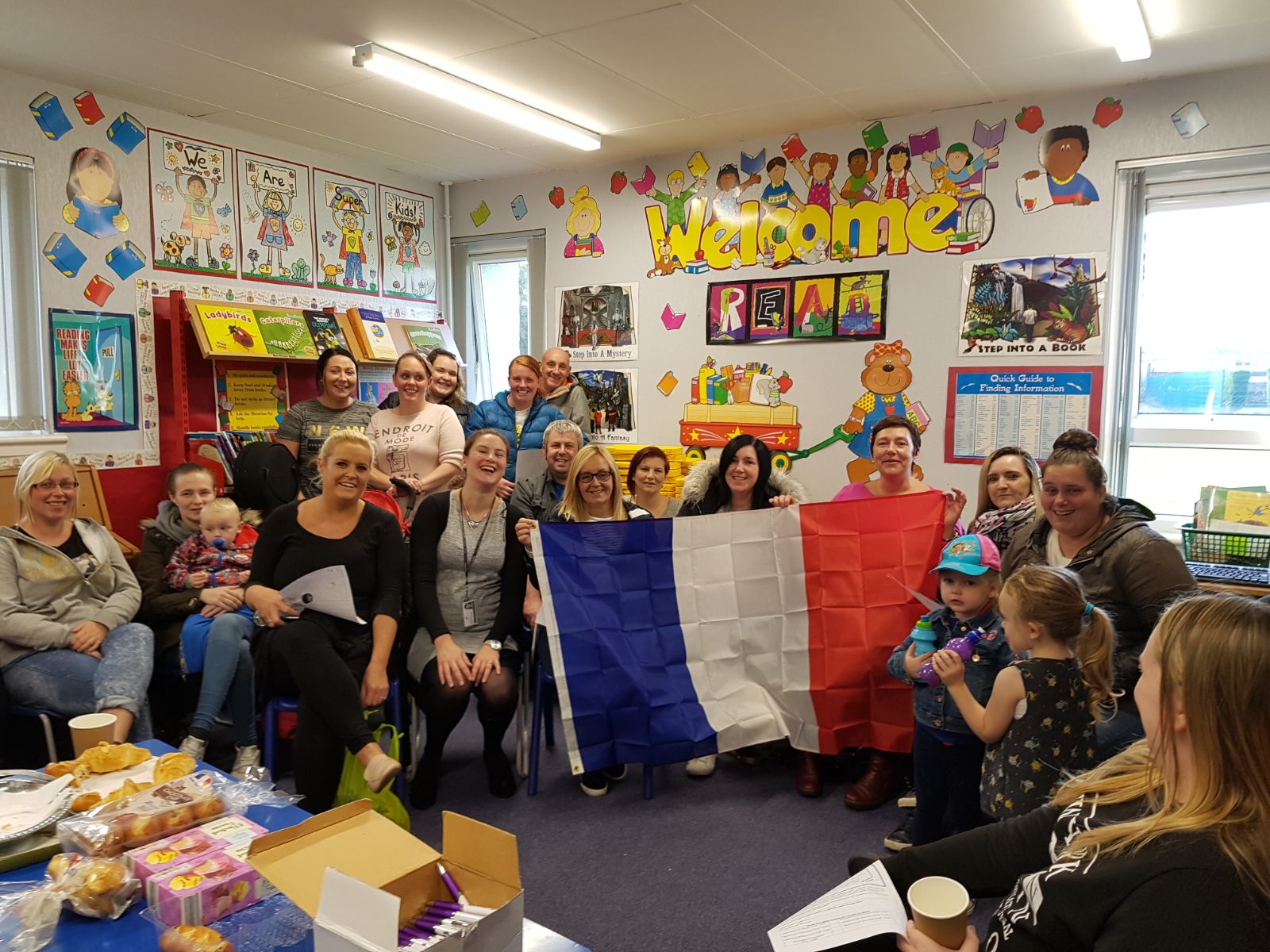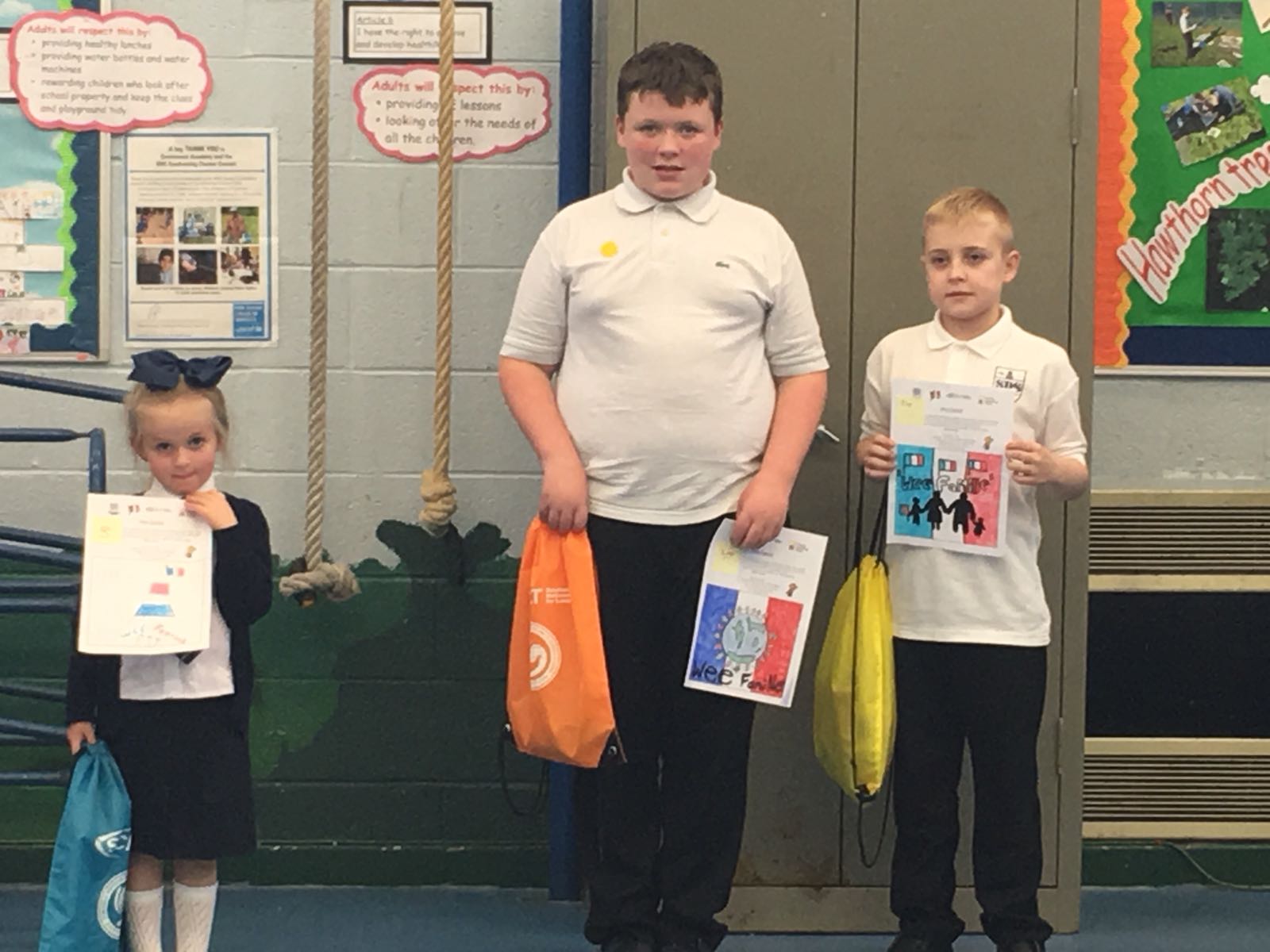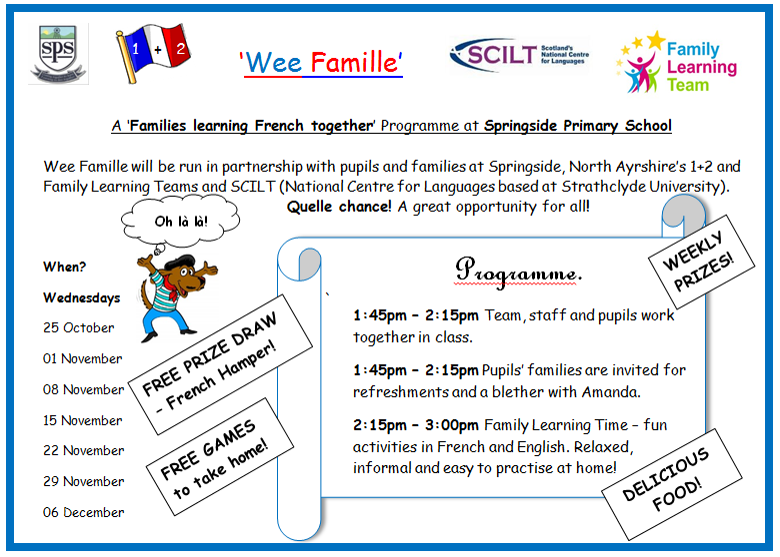“Family Learning encourages family members to learn together, with a focus on intergenerational learning. Family Learning activities can also be specifically designed to enable parents how to support their children’s learning (at home)…
'Family learning is a powerful method of engagement and learning which can foster positive attitudes towards life-long learning, promote socio-economic resilience and challenge educational disadvantage.' (Family Learning Network, 2016).”
- Education Scotland, 2016
All partners were determined that this project would encourage families to take an interest in their child’s learning of French whilst offering support and guidance to school staff in the delivery of future French learning opportunities.
The Development of ‘Wee Famille’
As a result of the initial planning stage, the name for this pilot project developed from ‘Oui Famille’ to the colloquial ‘Wee Famille’ as a play on words to reflect, not only the relatively small size of the school but also the Scottish-French alliance.

Following this initial planning stage, ‘Wee Famille’ developed as follows:
- Partners met regularly over a period of four months to fully discuss implementation and develop programme content, with SCILT and North Ayrshire’s 1+2 Team working to identify language learning opportunities, as well as exciting and engaging ways to deliver the language, and the Family Learning Team advising on the best way to work with and engage families in the project
- Local businesses were approached to help with the provision of weekly resources, prizes and catering items
- Partners met regularly with school staff to discuss plans. This happened weekly, after every family learning session. Feedback from parents was gathered at the end of each session, to allow the team to be responsive
- The seven week programme ran on Wednesdays from 13:45 – 15:00 with a focus on learning French vocabulary through a variety of games and activities each week
- The ‘Wee Famille’ Passport was developed to reflect weekly learning themes and support for follow-up home learning activities
- The Head Teacher created four vertical learning groups, ensuring that siblings and relations within the same family were appointed to the same group each week
- Weekly resources and session plans were designed collaboratively by the 1+ 2 Team and SCILT. Materials were printed and prepared by the FLT
- Parents were invited to a coffee afternoon (Focus Group) 2 weeks prior to the programme beginning (conducted by SCILT and the FLT) to investigate attitudes towards learning languages in the primary school
During the Focus Group, parents expressed the following opinions, feelings and attitudes:
- 'We expect everyone to speak English. Languages can take kids so far if they have languages'
- 'I think it’s good that they’re learning French in school. They absorb things much more easily when they’re younger. We’ve got relatives in Belgium who can switch between languages'
- 'I’m interested in learning because my older son’s at high school'
- 'I don’t see the point in learning languages, but I don’t mind learning some if it helps my wee girl'

Implementation
Prior to the programme starting, ‘Wee Famille’ was introduced to the school using a logo design competition. This winning logo was included on the ‘Wee Famille’ passport.
Every Wednesday afternoon for seven weeks, families were invited to learn French together with their child in school. The format each week was generally as follows:
| 13:00 |
Partners set up for weekly session
|
| |
Children |
Parents and families |
| 13:45 |
- Teaching staff and partners planned and delivered weekly sessions with children across the four vertical groups in four separate classrooms
- Children prepared to share their learning with their families
|
- FLW welcomed parents for registration and refreshments in hall and issued weekly raffle tickets
- FLW advised parents on the content of that week's session, encouraging them to try out the games, activities and introduce and re-inforce vocabulary to help build confidence before parents joined their children in class
|
| 14:15 |
Families came together in class for family learning time
|
| 14:55 |
Children returned to their own classes to prepare for home time |
Parents returned to the hall for weekly prize draw and evaluation with FLW |
| 15:00 |
Partners tidied up, debriefed and prepared for the following week's session
|

The content of the ‘Wee Famille’ Passport became an excellent tool to support learning at home, particularly for those parents who were unable to attend every session.
In addition, social media was used to spread the word and share resources, ensuring that all families were included.
The project culminated in a French celebration of learning, which included dancing, food tasting, Matisse inspired mural making, a ‘Wee Famille’ Quiz, face painting and a photo booth, with the final prize draw resulting in one family winning a special French themed hamper.